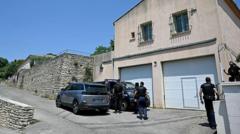A British court has sentenced 92-year-old Ryland Headley to life in prison for the 1967 rape and murder of Louisa Dunne, resolving a cold case through modern DNA analysis decades later. Headley's conviction comes after his DNA was matched to evidence collected during the original investigation, which had remained unsolved for nearly six decades.
Decades Later, 92-Year-Old Man Sentenced for 1967 Cold Case Murder

Decades Later, 92-Year-Old Man Sentenced for 1967 Cold Case Murder
Ryland Headley receives life imprisonment for the rape and murder of 75-year-old Louisa Dunne after DNA evidence resolves one of Britain's oldest unsolved cases.
In a historic ruling, British authorities sentenced 92-year-old Ryland Headley to life imprisonment for the 1967 murder and rape of 75-year-old Louisa Dunne, an emotionally charged conclusion to one of the nation's oldest cold cases. The verdict was announced on Tuesday, as a jury found Headley guilty earlier this week, reigniting interest in a crime that had haunted Dunne's family for nearly six decades.
The investigation into Dunne's murder was reopened by Avon and Somerset Police in 2023, leading to the forensic analysis of evidence that had remained dormant for decades. Among the items examined was a blue skirt that Dunne had been wearing at the time of the attack. Forensic specialist Heidi Miller noted that DNA matching had revealed the presence of semen linked to Headley, which was a breakthrough in the long-standing case.
Authorities revealed that Headley’s DNA had been entered into the system following an unrelated incident in 2012. In addition to the DNA evidence, a palm print found on Dunne’s bedroom window also matched with Headley. Police arrested him on November 19, 2024, and he has been in custody ever since.
During a police interview, Headley famously responded "no comment" to investigators’ inquiries regarding the murder. The initial investigation of Dunne’s tragic death had seen authorities fingerprint over 19,000 men and collect more than 1,300 statements, but Headley had not been identified during that period as he resided outside of Bristol.
Previously, Headley had been convicted in 1977 for two counts of rape in a separate case in Ipswich, where he targeted elderly women through violent break-ins. His life sentence was subsequently reduced, leading many to believe he might evade justice in the Dunne case.
The emotional toll of Dunne's murder has resonated through her family, with her granddaughter, Mary Dainton, expressing shock and relief upon hearing that authorities had finally identified Headley. Dainton recounted how her grandmother’s murder impacted her own life and the lives of her family members, particularly her mother, who she believed never fully recovered from the tragedy. The resolution of this case not only brings closure to the Dunne family but underscores the power of advancements in forensic science to uncover truth, even decades later.



















